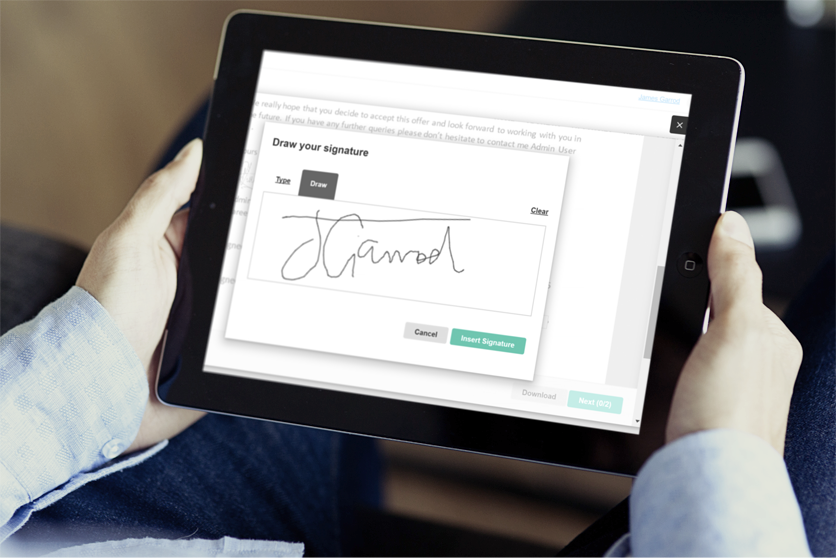Web-based recruitment systems have revolutionised the recruiting process for both in house and agency recruiters over the past decade. However, some ‘back-end’ recruitment processes still hark back to the pre-digital age – paper based, inefficient and expensive.
In particular, many companies still use paper-based forms for new hire onboarding and contingent workforce timesheets to provide authorisation and compliance with procedures.
Electronic Signatures (also known as eSignatures) offer the recruitment industry a solution to this problem. In essence, any manual, paper-based, recruitment process or task that requires an authorisation can benefit from eSignatures.
Here are six areas that in house and agency-side recruiters can improve by implementing electronic document signing.
Offer letters and employment contracts
Most applicant tracking systems were designed to manage the process from raising and posting a job through to selecting the preferred candidate. At this point there is usually a hand-off to an onboarding system (whether online or offline). Documents including the offer letter, contract of employment and so on, are then printed off and posted to the candidate. The signed forms are then returned, which is countersigned by the employer and then filed or added to a document management system.
Limited online onboarding has enabled candidates to download the offer documents from the employer’s careers site, or receive them via email for ‘wet’ signature and return – which could be via post or email. This can make the process difficult to track and ensure that signed offers are received in good time. This also has a negative impact on the overall candidate experience.
A 100% digital onboarding process, incorporating eSignatures can solve all of these issues. Ensuring offers are compliant, instantly sent, tracked and returned entirely through the web, with no need to post or even email the documents from either direction – employer and candidate.

(example of eSignatures in Eploy)
Agency terms and conditions of business
For recruiting firms ensuring clients sign and agree the terms and conditions of the business is critical in avoiding potential disputes. Most agencies will email terms and conditions to their clients. This process may even be automated through the use of a Recruitment CRM system. However, often the electronic document will then need to be printed by the client, signed and mailed back using regular post, causing potential delays.
Employee handbooks
Most companies have an employee handbook that contains operating procedures and policies. For an employee handbook to truly be valuable to the business and employee it’s important that it is read and accepted by each new hire. Electronic signing provides an efficient way to achieve this. The employee simply accesses an electronic version of the handbook, digitally signs it and a record of signature and the document itself are stored electronically.
Authorisation forms for payroll/direct deposit
Ensuring the new hire is set-up for payroll is another area that will benefit from eSignatures. This will help ensure that the new starter’s bank details and authorisation for deposit are set up in good time for their first payroll-run.
Pensions and Auto-Enrolment
The advent in the UK of workplace pension ‘Automatic Enrolment’ means that every employer must automatically enrol workers into a workplace pension if they:
- are aged between 22 and State Pension age
- earn more than £10,000 a year
- work in the UK
This has an additional impact on companies to manage the sign-up process for such schemes - another area that, through the use of eSignatures can be embedded into the onboarding process to streamline administration.
Timesheets
Managing a contingent workforce typically requires Timesheets as the point of truth between candidate, client and agent. Timesheets will often require signing by multiple parties and may require posting, fax or email to the relevant stakeholders to ensure hours worked are agreed and payroll is updated. Over recent years there has been a move toward online timesheets, enabling a faster transferal of information. However, in some cases signatures are still required. The ability for signatures to be provided online and at source has an obvious impact on the overall speed of managing the process as well as provide a validated proof of the hours worked. Modern recruitment systems are web-based and device independent, enabling timesheets to be signed and submitted via smartphones and tablets as well as traditional PC/Mac.
Want to learn more?
Get our free eSignatures in Recruitment whitepaper here